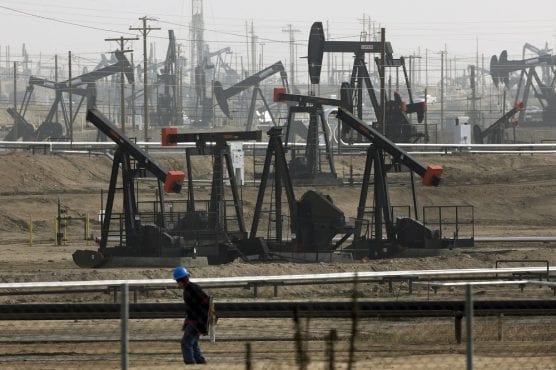By Nick Cahill
SACRAMENTO, Calif. (CN) — California Governor Gavin Newsom on Friday issued a sweeping ban of new fracking permits, claiming the popular oil extraction method contradicts the state’s future climate change goals and must be phased out.
Answering the calls of environmental groups that have been demanding a ban on the process formally known as hydraulic fracturing for over a decade, Newsom resorted to executive action after lawmakers rejected a proposal to ban the practice last week. The order directs regulators to stop issuing new fracking permits by 2024 and prep for the complete demise of oil extraction activities by 2045.
“The climate crisis is real, and we continue to see the signs every day,” Newsom said in a statement. “As we move to swiftly decarbonize our transportation sector and create a healthier future for our children, I’ve made it clear I don’t see a role for fracking in that future and, similarly, believe that California needs to move beyond oil.”
The order is the latest step Newsom has taken to reign in the controversial method that has been linked to oil spills, water contamination and seismic worries, but nonetheless provides thousands of jobs across the state.
In 2019 during his first year in office, Newsom issued a temporary moratorium on new permits for fracking and high-pressure steam operations. The move was prompted by a major oil leak at a Chevron site in Kern County, which ultimately seeped oil for months into a dry creek bed and resulted in a $2.7 million fine.
The moratorium was initially celebrated and viewed by environmentalists as a turning point in their fight against the oil industry, but their enthusiasm quickly waned.
Despite the pause and subsequent overhaul of the agency tasked with regulating the industry, the state resumed handing out new fracking permits in 2020, leading to a recent lawsuit by the Center for Biological Diversity. Critics claim the permits resumed at a hefty pace and without proper environmental review, despite Newsom’s assurances of stricter oversight.
The state’s wavering stance on fracking prompted new calls for a wholesale ban, but over the last year Newsom resisted and said he preferred the Legislature take the lead. On multiple occasions, the Democratic governor told reporters he was unsure whether he had the ability to bar the practice through executive action.
State Democrats responded with such a proposal this year, but the plan fizzled and was defeated in its first committee vote. Skeptical of the resulting job losses and potential strain on energy supplies, a group of Republicans and moderate Democrats shot down the bill and punted the fracking debate back to Newsom.
High-pressure steam and hydraulic fracking methods have become increasingly common in California as oil companies continue to pull heavy crude from land in oil-rich counties like Kern, Los Angeles and Monterey. In 2017, the oil industry generated over $152 billion in economic output and more than 366,000 jobs in California, according to a recent Los Angeles County report.
The executive order figures to be challenged by the oil industry, which remains incredibly influential in state politics. Oil producers claim fracking accounts for a major chunk of the state’s oil production — experts pin the figure closer to just 2% — and the ban will cost thousands of jobs.
“Newsom’s proposed ban on almost 20% of California’s oil will also end up hurting small businesses that have already been bruised by lockdowns and are now working hard to recover. We don’t need rushed mandates, we need policy that works for all of our communities,” said Kern Citizens for Energy on Twitter.
Friday’s announcement is the latest fracking ban in the United States: in February regulators from New York, Pennsylvania, New Jersey and Delaware permanently prohibited fracking near the Delaware River. It also comes as Newsom prepares to fight an expected recall effort in the fall.
State Senator Scott Wiener, whose anti-fracking legislation failed last week, applauded the move and said it was a “solid step” toward California’s quest for 100% clean energy.
“While we believe an earlier end date is appropriate, at least having a set end date will trigger the long overdue conversation about what a transition away from oil looks like,” said Wiener, D-San Francisco. “To date, political paralysis has prevented that conversation from happening. We hope the governor’s action today breaks that political logjam.”
Friday’s order directs the Department of Conservation’s Geologic Energy Management Division to steer the fracking phaseout and tasks the California Air Resources Board to develop plans to eject the oil industry completely by 2045.
Meanwhile environmental groups offered mix reaction to Newsom’s order.
NextGen senior policy adviser David Weiskopf called it a “huge deal” and added steps should be taken to protect neighborhoods and schools near current drilling operations.
“The fact that California, one of the biggest oil producing states in the county, is now contemplating the end of oil extraction is a huge deal. It gives us the chance to plan carefully for a managed phaseout, starting with the most dangerous and destructive operations, including fracking,” he said in an email.
Others like Sierra Club California want a more aggressive timeline for the phase-out.
“Time is not a luxury we have to tackle a crisis of this scale. If the governor is to continue to paint California as a pioneer in the transition away from fossil fuels, he’ll have to recognize this urgency and act swiftly,” said acting director Brandon Dawson in a statement.
Like this:
Like Loading...
Related





 Tweet This
Tweet This Facebook
Facebook Digg This
Digg This Bookmark
Bookmark Stumble
Stumble RSS
RSS

























REAL NAMES ONLY: All posters must use their real individual or business name. This applies equally to Twitter account holders who use a nickname.
0 Comments
You can be the first one to leave a comment.